- Home
- Roddy Doyle
Bullfighting: Stories Page 7
Bullfighting: Stories Read online
Page 7
There’s the rain now.
Yeah.
There’s the rain now. Him.
Yeah. Her.
And that was nearly – he looked at his watch – eight hours ago. And now he wanted to tell her a joke. It was mad. What’s the difference between a good ride and a good shite?
Mad.
Thick. Stupid.
He wasn’t angry now but. He wasn’t sure why he’d been angry.
That wasn’t true. He knew. But he wasn’t angry now.
He’d tell her the joke. He was nervous now. It was a good one to tell but. It was short, no story to it. He’d see if it worked as he told it.
What would he see? He didn’t know. It was what he wanted to see; that was the thing. Her face. He wanted to see her listening – that was all. See her face, see her listening. Knowing what he was up to. That would do.
He listened. She was out there, in the kitchen. He could hear her shoes. He knew, somehow – he didn’t know how: she was finishing up. The way she was moving, like she was leaving. She was going to hang up.
What’s the difference between a good ride and a good shite? He couldn’t do it. It was too mad, too desperate. She’d recognise it for what it was: begging. A cry for fuckin’ help.
That was stupid too but. It wasn’t a cry for anything. And it wasn’t fuckin’ begging. It was only a joke. There it was now; she’d put the phone down. She was still in the kitchen. It was more than a joke. He knew that.
Would she know?
He could hear her now.
She came to the door. She stopped.
He looked at her.
Ash
—We’ll still be friends, she said.
—Grand, he answered, and then he was walking down a street by himself, before he fully understood what had happened. He knew the street, although not very well. He wasn’t sure why he was there, why they’d gone over to this part of the city. His wife had just told him she was leaving him. Or he was leaving her. One or the other.
And they’d still be friends.
Grand.
He made it home. He got the Dart, figured out how to get a one-way ticket out of the vending machine at the station. He’d left the car for his wife. She wasn’t there when he got in. He paid the babysitter.
Later, Ciara came home. And she was all over him. She climbed onto him and cried as she came.
—I’m so, so sorry.
And that was that, he thought, if it had ever been anything in the first place. He didn’t want to ask her if she’d actually told him that she was leaving him. He knew she had. It didn’t matter.
—You’ll be fine, she said, after she’d kissed his stomach and lay tucked in beside him. He’d passed a test, or something. He was delighted. She was gone in the morning.
He went to work. The house was empty when he got home after collecting the girls. He thought: This is it, this is me. I live alone. With the kids. She’d taken nothing. The bedroom was exactly the same. Her book was still beside the bed.
She came in very late. He wasn’t sure – he didn’t know – if she’d changed her mind or if she’d just come home later than usual. She was drunk – he didn’t ask. She rode him again, said nothing about being sorry this time. She didn’t cry.
Then she was gone again.
He put Erica and Wanda to bed again the next night, made them brush their teeth, read a story to them. Kipper’s Toybox, twice.
—Where’s Mammy?
—Work.
—Poor Mammy.
—Yeah.
He turned off their light and made sure their bedroom door was open exactly as wide as they wanted it.
—More.
—No, stop.
—More.
He went downstairs. Ciara didn’t come in. He put the mobile phone beside him, on the arm of the chair. He watched telly. He slept. She didn’t phone. He went up to the bed. He turned off the light.
He woke up. She wasn’t there. Three in the morning. And she wasn’t downstairs. He went back up to the bed but he didn’t sleep. He went down to the kitchen again. He accepted it as he put the coffee on the hob: She’s left me.
—You think she has? said his brother, Mick.
—Yeah.
They were in the kitchen.
—You think? said Mick.
—Yeah.
—Well, like. Did she actually tell you she was leaving?
—Yeah, he said.—I think so.
—You fuckin’ think so? Jesus, Kev, you can fuckin’ do better than that.
—She told me.
—Grand. And what happened then?
—She rode the arse off me.
—Strange, said Mick.—But it makes sense too. The long goodbye. The ride of the guilty. You’ve heard of it.
—No.
—It’s brilliant, said Mick.—I recommend it. What happened then?
—I think she went to work.
—Is she riding anyone else?
The question shocked him. Although it shouldn’t have. It annoyed him, the invasion. And frightened him.
—I don’t think so, he said.
—Think again.
—As far as I know.
—Okay.
—How would I know?
—Well, said Mick.—She might have told you.
—No.
—Sure?
—Yeah. I think so – no – yeah.
—Okay, said Mick.—Credit card statements.
—Hang on, said Kevin.—It’s the man who always gets caught because of his credit card. Am I right?
Mick shrugged.
—Does she have her own card?
—Yeah, said Kevin.—’Course.
—So, let’s have a gawk. It can do no harm.
Kevin was starting to dislike his brother, but this wasn’t a new feeling.
—No, he said.
Mick shrugged again. He was a cunt for the shrugging.
—Okay, he said.
He stood up. He had to go to their mother’s.
—She’s complaining about the jacks.
—She’s always complaining.
—Ah, she’s not the worst, said Mick.—It won’t turn off properly, or something.
—The toilet?
—Yeah, said Mick.—She says it sounds like the cistern is talking to her when she’s downstairs and it’s upstairs.
—It’s always upstairs. It’s attached to the fuckin’ wall.
—You’re becoming a very bitter little man, Kev.
—Fuck off, Mick.
—This is me fucking off, said Mick as he walked to the back door.—Away, to have a chat with our mother’s toilet. What a fuckin’ life. Good luck.
Kevin took out the accordion file where they kept the bank statements, the insurance stuff, birth certificates, and all the other crap they were supposed to keep. It was in the wardrobe, at the back, behind her shoes and boots, a heap of the things.
He sat on the bed and held one of her high heels as he looked at a recent statement. He put the page on a pillow, propped a bit, and he read it from a distance. He didn’t really read it – you couldn’t read a bank statement. He gave it a quick look; he glanced down the page.
—Why are you holding Mammy’s shoe?
It was Erica, the younger one.
—What makes you think it’s Mammy’s shoe?
He hadn’t a clue why he’d said that.
—It is, said Erica.
—You’re right, said Kevin.—It was on the floor. Do you want to put it back?
—Can I, like, wear them?
—Yeah, alright.
—Can Wanda?
—Yeah.
—Wanda!
He left the girls in the bedroom lining up the shoes.
—Where’s Mammy?
—Work.
—Poor Mammy.
—That’s right.
—Always working.
—Now you’re talking.
He went downstairs.
—Nothing, he said, wh
en Mick answered his mobile.
—What?
—I looked. There’s nothing on the credit card statement.
—Nothing incriminating, no?
—Jesus, Mick, take it easy.
—Well, said Mick.—What were you looking for?
—I don’t know, said Kevin.
He was regretting he’d called Mick now. Big time. But he’d had to.
—A name or something, he said.
—A name? said Mick.—What name? D’you think she’s paying whoever she’s having the affair with?
—No. What affair?
—Or it’s a rent boy or something. She has to pay someone to—
—No. Fuck off.
—Any restaurants?
—No.
—Hotels?
—No.
—He’s paying, so.
—Who?
—The rent boy.
—Fuck off, Mick.
—Stranger things have happened, man. People go off the rails in times of recession. Especially women.
—What are you on about?
—The moral compass, man, said Mick.—They try to ride the fuckin’ thing.
—Goodnight.
Mick texted him.
Hav u foned hr?
No.
Wy not?
He phoned Mick.
—Because I’m frightened.
—Okay, said Mick.—I’m with you.
Mick wasn’t the worst, Kevin thought.
—What would you do? he asked.
—Well look it, man, said Mick.—Just to remind you. I live in a poxy one-room flat because I had a short, meaningless fling with my son’s religion and civics teacher, who gave him a note to give to me and he – and I love my son, I blame only myself – he gave the note to his mother instead. Who read it, and it said—
—I know.
—You can do it to me that way next time.
—I know, sorry.
—Ten words that shook the fuckin’ world.
They were enjoying themselves.
—And you want to know what I’d do if I was in your position?
—Yeah, said Kevin.—I do.
—Grand, said Mick.—I haven’t a clue.
—Goodnight, Mick.
—Go a bit mad.
—Thanks.
—You asked.
—How?
—How what?
—How would I go mad?
—Wife-swapping.
—I’d need a wife.
—True.
—Goodnight, Mick.
—Let me work on it.
—Goodnight.
—I’ll get back to you.
—Okay.
He went to his room – their room – and started throwing the shoes back into the wardrobe.
—Excuse me!
It was Erica.
—We’re, like, trying to sleep in here!
—Yeah!
—Sorry.
He got down on his knees and put the shoes and boots away, quietly. He piled them. The wardrobe door swung slowly towards him and with it the full-length mirror. He looked, and saw nothing. He wasn’t there. He pushed the door back slightly. And there he was.
He got into bed. He phoned her. Her voicemail was gone. It was the automated voice, the Vodafone woman, telling him to leave a message. He had nothing ready and he couldn’t think of anything he wanted to say out loud – the kids miss you; I miss you; where the fuck are you, you stupid mad bitch of a cunt? – so he said nothing.
Mick texted.
Jaksns, snday.
Jackson’s was a pub near Mick’s place. It was an ordinary pub six nights a week but on Sundays, according to Mick, it changed. It filled up with men – in wmn – of a certain age, who were no longer married or had never been married.
—People like you.
—Exactly, said Mick.
—And that’s going wild, is it? said Kevin.—Going to a pub full of Micks?
They were laughing.
—Works for me, said Mick.—No one goes home empty-handed.
—Lovely, said Kevin.—I can’t wait.
—I’m telling yeh, man, said Kevin.—I went home the last time with fifty-seven-year-old twins.
—Oh Jesus.
—Combined age, one hundred and fourteen.
—Goodnight, Mick.
—Next Sunday, so.
—No, fuck off. I’ll think about it.
—Do that.
—Goodnight.
He did think about it. Sunday was four days away. He’d need a babysitter. The young one from next door. Grace. The girls loved her. He could only stay out till eleven, because Grace would have school on Monday. That would give him two hours in Jackson’s. Two hours of abandonment. Then he’d have to come home. He’d come into the house and pay Grace, while Mick’s twins hid behind the car till the coast was clear. Or he could sneak them up the stairs, then go back down to pay Grace and send her home. Or he’d sneak them up the stairs – they’d be pissed and too skinny and giggling – into the bedroom, and Ciara would be in the bed, waiting for him. He’d sneak them up the stairs, send Grace home, then stand at the bottom of the stairs, all night, till he could go to work. He’d sneak them up the stairs, and – he could see this now; he groaned – they’d go into the wrong room and wake Erica and Wanda. Oops! Or, he’d go to Jackson’s, have three pints, and come home. Mad.
Wild.
It wasn’t funny.
He’d stop at the chipper on the way home.
It wasn’t funny.
He wasn’t going anywhere on Sunday. Mick and his fuckin’ twins.
He woke before Ciara got into the bed.
—Hi, she said.
—Hi.
—I don’t want to have sex with you.
—Fine.
She climbed in. He didn’t have to move. He was lying on his side of the bed. She lay back, and turned. She put her hand on his shoulder. She patted it – he thought she did. He felt her breath. He could smell it. No wine or anything – just toothpaste. He was asleep before her – he thought he was. And she was there when he woke.
She came into the kitchen. The girls were still asleep. They’ll be delighted to see you. It was business as usual, although they managed to avoid touching or looking at one another. So are you back, or what? She cleared the old plates off the table. She got a cloth from the sink, wiped the table and put four bowls and four spoons on the place mats.
—We’ll have to talk, she said.
He chopped a banana, to put on top of the girls’ cornflakes.
—Okay, he said.
About what?
He threw the banana’s brown skin in the bin, so the girls wouldn’t see it and object. He looked, but Ciara wasn’t in the kitchen.
She’d gone up to wake the girls. He could hear the squeals. He didn’t want to hear them laughing; she didn’t deserve them – he didn’t want to think that. He turned on the radio, to get the news. He was bang-on, half-seven. He actually listened.
He ran to the hall.
—Come down, quick!
—Why?
—The news! Come on!
They all sat in front of the telly and watched the Icelandic volcano erupting.
—Amazing.
They looked at the cloud as it grew and curled.
—It’s all ash, he told them.
—What’s ash?
Erica’s question – it was one of those brilliant moments. Kevin and Ciara looked at each other. They smiled. There were no coal fires in the house and neither of them had ever smoked. The cooker was electric. Nothing was ever burned. There was no real religion, at home or in school, so Erica had never noticed the grey thumbprints on Ash Wednesday, on the foreheads of the old and the Polish. A child like Erica could get this far without knowing what ash was, until she saw it spewing from a mountain.
—It’s like dust, he said.—Burnt.
—What burnt?
—Stone, I think. I’m not sur
e.
—Stone?
—I think so.
—You, like, can’t burn stone.
—If it’s hot enough, you can. Lava.
—It’s scary.
—It’s only a cloud.
They sat and watched, and ate, and gathered the expertise. Ash killed planes; it attached itself to the turbine section of the engines.
It was an act of God.
—What’s that?
—Nature.
It had nothing to do with climate change or the economy. No one was to blame. All flights in and out of Ireland, in and out of Europe and everywhere, were cancelled. The airports were crowded and shut. There was no escape.
—Does that mean there’ll never be any more planes?
—No, said Kevin.—It doesn’t.
He looked at Ciara.
—It’s just for a while. Things will get back to normal after the ash drifts away. Or falls.
—Falls?
—Yeah.
—Will it hurt?
—No, said Ciara.—It won’t.
Funerals
His parents went to the chipper after funerals. Bill found this out when he drove them home from one – the dead husband of his mother’s long-dead sister. He’d driven them there because the church and the graveyard were down the country, in a small kip of a village that seemed untouched by the now dead boom, except for the fact that the priest was Polish. His father wasn’t happy driving off the main roads any more, and his mother had shrunk. She couldn’t reach the pedals.
So she said.
Bill had said he’d bring them, and they’d climbed into the back of the car like they were his kids and they were all going off on a picnic. Already, he was making it up. He couldn’t wait to tell his wife and kids – his real kids.
He even bought them ice creams on the way.
He didn’t actually do that, but it was what he told Hazel and the girls when he got home. He saw the big cone outside a shop ahead of them.
—D’yis fancy a 99?
—Ah, no, said his mother.—It wouldn’t be right.
—Go on. Where’s the harm?
—Alright.
He had them licking away in the back of the car while he turned off the main road, onto a glorified lane that was all corners and gear changes.
They found the village. He drove through it before he knew they were there.
There was the mass. The priest sounded like a culchie who’d spent his childhood in Eastern Europe.

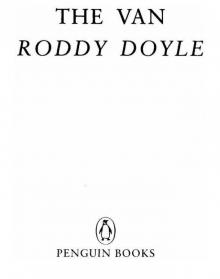 The Van
The Van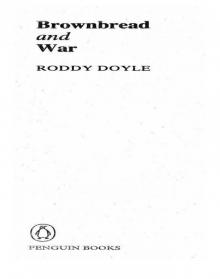 Brownbread & War
Brownbread & War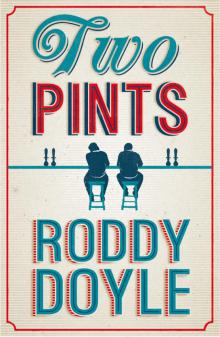 Two Pints: A Collection
Two Pints: A Collection Rover and the Big Fat Baby (Giggler 4)
Rover and the Big Fat Baby (Giggler 4) The Dead Republic
The Dead Republic Paddy Clarke Ha Ha Ha
Paddy Clarke Ha Ha Ha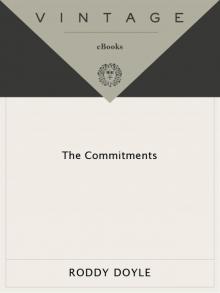 The Commitments
The Commitments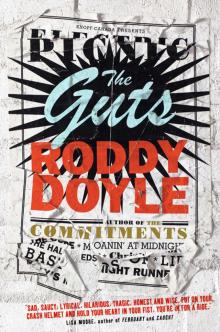 The Guts
The Guts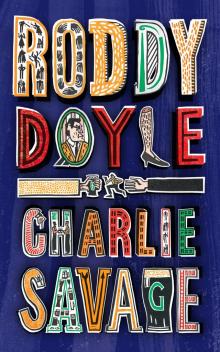 Charlie Savage
Charlie Savage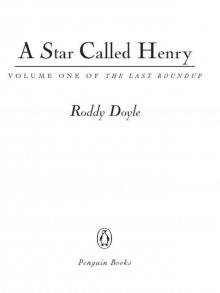 A Star Called Henry
A Star Called Henry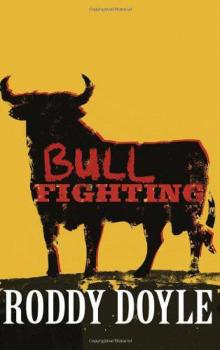 Bullfighting: Stories
Bullfighting: Stories Two More Pints
Two More Pints The Snapper
The Snapper Oh, Play That Thing
Oh, Play That Thing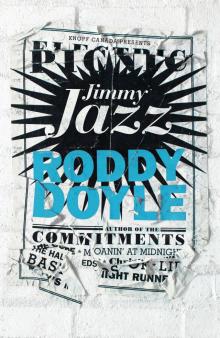 Jimmy Jazz
Jimmy Jazz Paula Spencer
Paula Spencer Wilderness
Wilderness The Woman Who Walked Into Doors
The Woman Who Walked Into Doors The Deportees
The Deportees Rover and the Big Fat Baby
Rover and the Big Fat Baby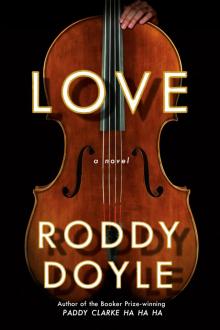 Love
Love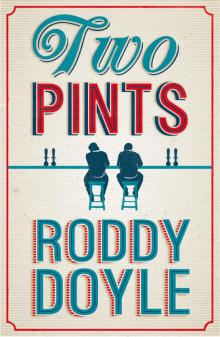 Two Pints
Two Pints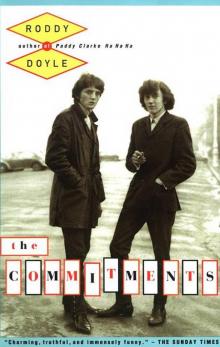 The Commitments b-1
The Commitments b-1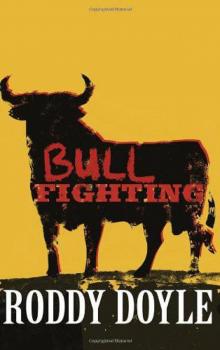 Bullfighting
Bullfighting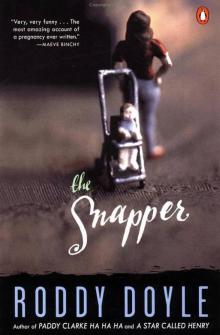 The Snapper b-2
The Snapper b-2